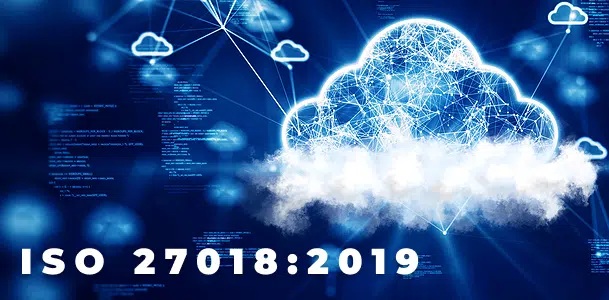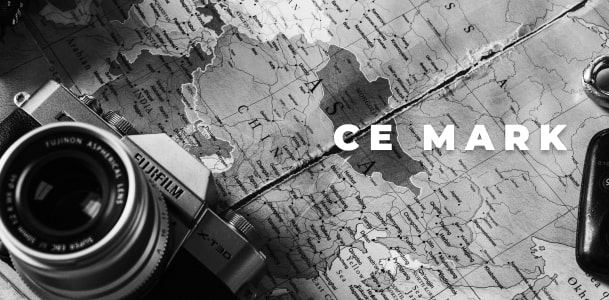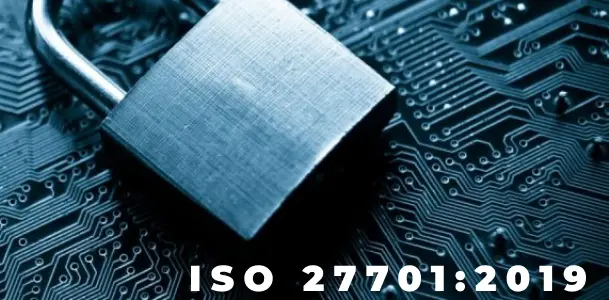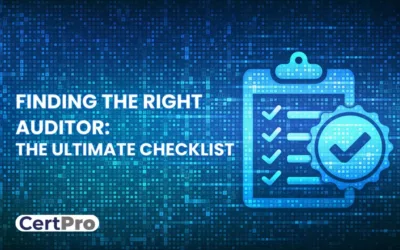FRANCE
ISO CERTIFICATION IN FRANCE
France, a country in Western Europe, is one of the countries that prioritizes ISO certification as a requirement for many different companies and sectors nationwide. The nation’s unique geographic location, surrounded by numerous European countries and the Mediterranean Sea to the south, underscores its dedication to global trade and quality standards. France, one of the biggest economies in Europe, has developed manufacturing, technology, and service industries that account for a significant portion of its GDP. Improvements in these areas have contributed to the nation’s economic shift from primarily agricultural to urbanized and industrialized, with the service sector being essential to employment and GDP, highlighting ISO certification’s critical role in upholding quality standards.
France, a country well-known for its contributions to luxury products, automotive, aerospace, and fashion, depends on ISO certification to guarantee that international standards are followed, improving its competitiveness and dependability in the worldwide market. The nation’s dedication to research and innovation in a variety of industries emphasizes even more how crucial ISO certification is to maintaining safety and quality standards. France’s diverse geography, encompassing bustling urban centers and charming rural areas, contributes to the thriving tourism industry. To ensure that both local and foreign guests receive high-quality service and are safe, ISO certification is essential in the hospitality and tourism industries.
As one of the most educated countries in the world, France places a high value on the development of knowledge and skills. The significance of ISO certification in educational institutions is evident through substantial investments in the education sector and a high literacy rate. These factors highlight a dedication to maintaining quality standards in academic and research activities. ISO certification is essential in France for maintaining competitiveness, quality, and safety in a changing and varied economy. ISO certification is still essential in many sectors of the economy, including industry, services, research, tourism, and education. This is consistent with France’s role as a major player in global trade and commerce.
WHY ISO CERTIFICATION IN FRANCE?
For French firms looking to maximize operational efficiency, guarantee quality, and foster confidence, obtaining ISO certification is crucial. Its ISO accreditation demonstrates the organization’s unwavering commitment to maintaining strict standards across various sectors in France. Especially, the need for ISO 9001 certification is emphasized, stressing the importance of quality management and empowering French businesses to manufacture dependable, customer-focused products and services. The importance of ISO 14001 in addressing environmental management cannot be overstated; this is especially true for France, which is trying to achieve sustainable development in the midst of fast industrial expansion. The relevance of ISO certification—in particular, ISO 27001—in protecting sensitive data in the ever-changing digital landscape is becoming more and more apparent in the period of France’s digital transformation.
These certificates give firms a competitive edge globally and boost client confidence, especially in the diversified French market. A commitment to strict standards, improving product reliability, and reducing waste is indicated by ISO accreditation. It also simplifies procedures, which promotes higher output and lower expenses. Several ISO certification bodies are based in France and provide certification services, advice, and evaluations to help companies get certified. In essence, ISO certification in France gives companies the capacity to build strong frameworks, follow international best practices, and actively promote excellence, sustainability, and security—all of which advance the country.
UNDERSTANDING ISO CERTIFICATION IN FRANCE
Obtaining ISO 9001 certification in France is indicative of a company’s commitment to providing dependable and superior goods and services. With France’s industrial landscape evolving, the ISO 14001 standard—which emphasizes sustainable growth and addresses environmental concerns—is becoming more and more important. Preserving confidential information is consistent with the spirit of ISO 27001, which reflects France’s dedication to digitalization. The French market is very broad, so ISO certification boosts client confidence and makes it possible for businesses to compete internationally. Beyond demonstrating adherence to strict guidelines, ISO certification improves product reliability through streamlining procedures, cutting down on waste, and getting rid of inefficiencies.
Related Links
SOC 2 in France
ISO 27701 in France
GDPR in France
ISO 27018 in France
HIPAA in France
CCPA in France
PIPEDA in France
ISO 17025 in France
ISO 13485 in France
CE Mark in France
GDP in France
GLP in France
ISO 9001 in France
ISO 14001 in France
ISO 45001 in France
ISO 22000 in France
HACCP in France
ISO 22301 in France
ISO 21001 in France
ISO 41001 in France
ISO 20000-1 in France
ISO certification enables companies in France to establish robust frameworks aligned with international best practices. Companies that put quality, sustainability, and security first not only benefit themselves but also improve France’s reputation abroad. Through ISO certification, the International Organization for Standardization (ISO) formally acknowledges adherence to predetermined standards in a business’s management system, practices, products, or services. This internationally recognized, independent organization creates and distributes standards to guarantee effectiveness, safety, and quality in a range of sectors. The extensive use of ISO standards enhances credibility by making it simpler for French companies to enter foreign markets. Businesses that are ISO-certified may show their dedication to quality and ongoing development, which gives them a competitive advantage. The ISO 14001 accreditation is in line with France’s focus on environmental management and sustainability, and ISO standards often take into account consumer needs, which increases customer retention and satisfaction. ISO accreditation is critical for French suppliers participating in global supply chains. Continuous improvement is a crucial component of ISO certification, helping French businesses stay competitive and streamline their operations. In the end, ISO certification improves a company’s standing by confirming compliance with global quality standards, which in turn builds trust with customers and partners.

THE ESSENTIAL STEPS OF THE ISO CERTIFICATION PROCESS IN FRANCE INCLUDE THE FOLLOWING:
Preparation and Awareness: Begin by gaining a comprehensive grasp of the specific ISO standard relevant to your sector and business goals. Familiarize yourself with the advantages, prerequisites, and procedures for implementing the standard.
Planning: Create a thorough plan that outlines the actions needed to bring your processes into compliance with the ISO standard. Create an implementation timeline and designate roles based on it.
Documentation: Generate or revise essential documentation, such as policies, procedures, work instructions, and records, to ensure they align with the stipulations of the ISO standard.
Implementation: Incorporate your organization’s documented processes and procedures seamlessly across the entire structure. To ensure a successful implementation, closely monitor the proceedings and make any necessary adjustments.
Internal Audit: Perform an internal audit to identify any non-conformities and evaluate the effectiveness of the implemented processes. Address these issues promptly and make the necessary adjustments.
Management Review: Evaluate the progress, effectiveness, and suitability of the ISO management system implementation through a management review. Identify whether any modifications or improvements are necessary.
Certification Body Selection: Select a trustworthy certifying organization to carry out the external evaluation. To determine whether you are prepared for certification, the certifying authority will carefully examine your implementation, policies, and procedures.
Stage 1 Audit (Document Review): The certification organization initially assesses your documentation and procedures, ensuring their compliance with the ISO standard.
Stage 2 Audit (On-Site Audit): To verify the implementation of your ISO management system and assess the adherence of your processes to standard standards, the certification authority conducts an on-site audit.
Certification Decision: The certification body determines whether to grant certification based on the audit findings. If your business aligns with the standards set by the ISO, it will be awarded an ISO certificate.
Surveillance Audits: To ensure ongoing compliance with the ISO standard, the certifying body conducts regular surveillance audits. These audits typically occur annually.
Throughout the entire process, strict adherence to the certification organization’s criteria and close communication with them are crucial.
POPULAR ISO STANDARDS IN FRANCE
ISO standards significantly enhance the security and quality control of various businesses. Information security’s cornerstone, ISO 27001, provides businesses with a thorough structure for safeguarding their assets and data. This international standard offers adaptable options for putting in place strong information security management systems that are tailored to the particular requirements of businesses looking to protect their information assets.
Regarding food safety, ISO 22000 stands out as an important industry-specific standard. It outlines the specifications for a management system for food safety, emphasizing the need to uphold sanitary procedures in businesses that handle food items. Given the widespread significance of food safety, ISO 22000 is a crucial standard that guarantees food companies follow strict guidelines to protect the health and welfare of their customers.
The ISO 13485 standard establishes the requirements for medical device quality management systems for businesses in the medical field. This certification guarantees that businesses that produce medical equipment follow strict quality and security guidelines. ISO 13485 focuses on the careful examination of manufacturing processes in order to ensure that medical devices are produced in a safe and dependable manner while adhering to industry standards.
In the larger scheme of things, ISO 9001 stands out as a universally accepted standard that supports a wide range of industries. Because its main focus is on customer happiness and operational development, it may be applied to businesses of any size or sector. Organizations can improve their systems, satisfy customers, and prove legal compliance globally with the help of ISO 9001 certification, which is reasonably priced and competitive in France.
BENEFITS OF ISO CERTIFICATION IN FRANCE
In France, ISO certification serves as an assurance that products and services conform to international quality standards, thereby enhancing customer satisfaction and providing businesses with a competitive advantage. Moreover, ISO certification mitigates the risk of business failure by ensuring the precise implementation of processes. The certification process brings substantial advantages to French organizations, fostering growth, credibility, and operational excellence.
Primarily, ISO certification elevates a company’s position in the French marketplace by demonstrating adherence to global standards, ultimately building client trust. This heightened credibility leads to increased customer loyalty and retention, strengthening the company’s position in the market.
The implementation of ISO certification in France reduces trade obstacles, creates a recognized quality baseline, and streamlines the process of entering the international market. This is particularly advantageous for French companies looking to expand internationally and investigate global commercial prospects. Additionally, French businesses with ISO certifications have an advantage over rivals in the market because of their commitment to efficiency, quality, and ongoing development. This helps them stand out from the competition and draw in potential customers and business partners.
- Global Recognition: The global acceptance of ISO certification opens doors for French companies, enabling them to participate in cross-border commerce and increase their market share abroad. This recognition gives French businesses a significant competitive advantage and helps them build a reliable and reputable brand in international markets.
- Enhanced Credibility: At both the domestic and international levels, it enhances the credibility and trust of clients, partners, and investors.
- Competitive Advantage: Businesses holding ISO certification stand out from their competitors by demonstrating their commitment to excellence and quality.
- Operational Efficiency: Enhancements in processes contribute to an overall improvement in operational effectiveness.
- Supply Chain Integration: ISO accreditation is vital for numerous international supply chains, providing opportunities to engage in collaborations with partners abroad.
- Market Standing: Achieving ISO certification enhances a company’s market reputation, attracts more clients, and expands business opportunities.
- Legal and Regulatory Compliance: ISO certification simplifies compliance with both national and international laws.
- Investor Confidence: Demonstrating a commitment to best practices boosts investor confidence.
ISO certification in France facilitates the ability to excel in a competitive landscape, instill confidence in global markets, uphold ethical and sustainable business practices, and consistently enhance operations for enduring success.
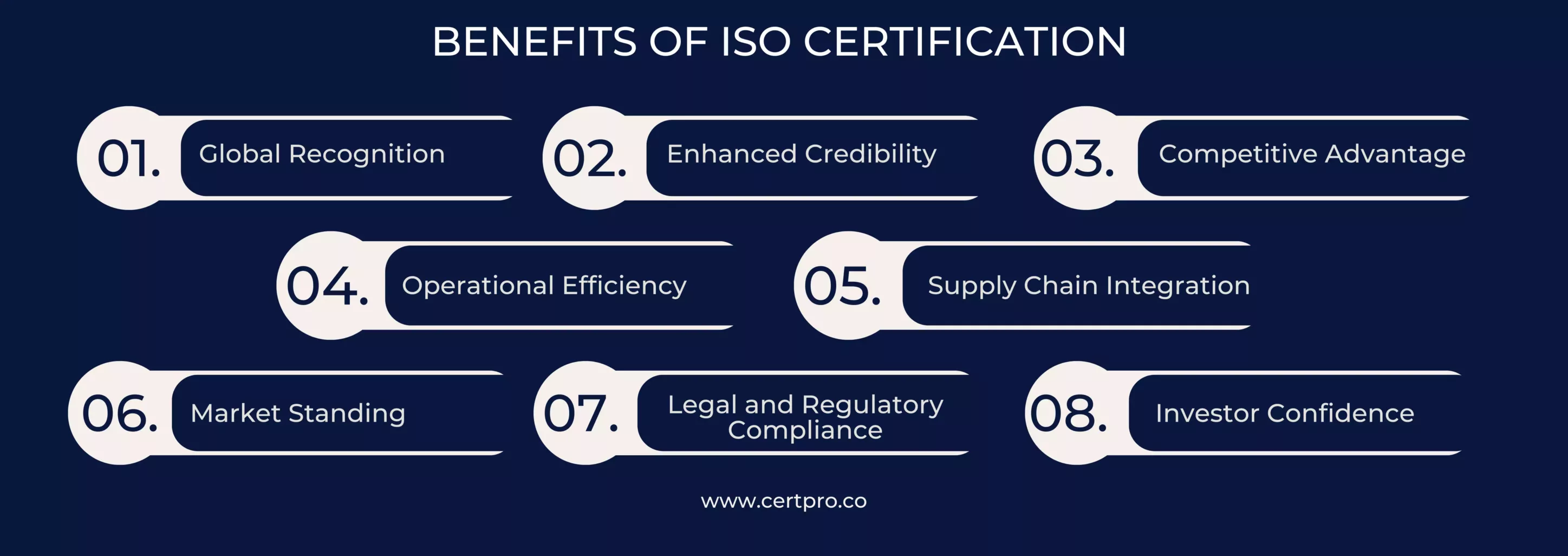
ISO CERTIFICATION BODIES IN FRANCE
The Standards Council of France (SCF) serves as the national accrediting agency for certification bodies in France. Numerous certifying bodies in France have the authorization to issue ISO certification under the jurisdiction of the SCF. These accredited entities conduct audits of businesses to verify adherence to diverse ISO standards. This is a list of some of the well-known French ISO certification authorities:
Factocert: Factocert helps companies get and keep a variety of certifications. It offers certification services and consulting. The organization is likely to offer assistance in aligning with international standards, such as those established by the International Organization for Standardization (ISO). Information security, environmental management, occupational health and safety, and quality management are a few of the domains that Factocert may offer services in. Organizations seek to fulfill industry standards, increase operational effectiveness, and show a dedication to best practices in their particular fields by partnering with Factocert.
Siscertifications: A certification authority that most likely offers services connected to certification and adherence to different international standards is SIS Certifications. The company may assist businesses in acquiring certifications similar to those specified by the International Organization for Standardization (ISO). SIS certifications likely cover various requirements, including information security, quality management, environmental management, and occupational health and safety. Companies pursuing SIS certifications probably want to meet industry-specific criteria, show that they are committed to upholding global best practices in their particular industries, and increase their credibility.
IAF CertSearch: IAF CertSearch is an online database offered by the International Accreditation Forum (IAF).It allows users to verify and search for accredited management system certifications worldwide. Users can access information on organizations that hold valid certifications to various standards, such as ISO 9001 (Quality Management), ISO 14001 (Environmental Management), and others. IAF CertSearch aims to enhance transparency and provide a reliable platform for stakeholders, including businesses and consumers, to validate the authenticity of certifications and promote confidence in accredited organizations globally.
Veave: International Organization for Standardization (ISO) standards are just one of the certifications and consulting services offered by Veave, which helps companies get and keep a variety of certifications. It is probable that the corporation provides assistance to organizations dealing with information security, quality management, environmental management, and occupational health and safety. Veave helps firms conform to global best practices, boost competitiveness, and show a commitment to industry standards by providing certification and consulting services. Companies that partner with Veave strive to increase productivity, meet quality requirements, and demonstrate a commitment to industry best practices.
Orion: Orion offers clients a flawless and exceptional service by customizing the certification procedure and improving on the established method. Our skilled and dedicated auditors work directly with customers to improve their service, quality, and competitiveness in the market. Clients can anticipate thorough and unbiased audits because of our value-added methodology and service-driven mentality. With a commitment to excellence in all facets of the certification process, Orion is committed to providing third-party certification services that surpass customer expectations and demands.
INDUSTRIES THAT BENEFIT FROM ISO CERTIFICATION IN FRANCE
Many French businesses have realized the importance of ISO certification in propelling their development, given the many benefits it provides and the significant influence it has on different industries around the country. These certifications represent a strong commitment to quality, security, and sustainability and go beyond simple status symbols. For example, the manufacturing industry gains real advantages from ISO 9001 accreditation, like improved product quality and increased operating efficiency. Due to the fact that customers view ISO accreditation as a mark of dependability, this certification increases customer satisfaction while giving businesses a competitive advantage in the marketplace.
Since data is becoming more and more valuable in today’s world, ISO 27001 accreditation is crucial for France in the field of information technology. This accreditation is essential for the IT business to exploit technological breakthroughs while protecting sensitive data, since it strengthens risk management and data security practices. Beyond just being profitable, it is essential for establishing client trust in a variety of settings. In a similar vein, the automotive industry-specific ISO/TS 16949 standard upholds France’s reputation as a world leader in the production of premium automobiles, guaranteeing their dependability and security. Precision, legal compliance, and strict standards compliance are major benefits to the country’s healthcare system.
These certifications extend their impact beyond individual companies, championing sustainable construction practices and advancing environmental building technologies. French businesses enlist the assistance of ISO consultants in France to ensure adherence to ISO standards, guiding them through the certification journey. This commitment encompasses certifications reinforcing data security, privacy, and healthcare standards in France, such as ISO 27001 Certification in France, SOC 2 Certification in France, GDPR Certification in France, HIPAA Certification in France, and PIPEDA Certification. Pursuing ISO certification in France signifies a dedication to broader societal and environmental well-being alongside corporate success, with ISO consultants in France providing strategic guidance to navigate the certification landscape effectively.
FAQ
What is the significance of ISO certification in France?
ISO certification in France is crucial for organizations across various sectors, signifying a strong commitment to international standards, quality, and sustainability. It enhances market competitiveness, operational efficiency, and confidence in global trade.
How can a company in France obtain ISO certification?
To achieve ISO certification in France, a company should undergo processes like certification preparation, implementation of ISO standards, internal audits, selection of a certification body, and completion of external audits.
What are the key benefits of ISO certification in France?
ISO Certification in France offers benefits such as increased reputation, improved market access, operational efficiency, enhanced customer trust, regulatory compliance, and alignment with sustainable practices.
Why is ISO 9001 certification significant for Danish organizations?
ISO 9001 certification in Denmark signifies a commitment to quality management, enabling companies to develop reliable and customer-focused goods and services. This certification is crucial for enhancing product quality and gaining a competitive advantage in the marketplace.
What are the essential steps in the ISO certification process in France?
The ISO certification process in France involves preparation, planning, documentation, implementation, internal audit, management review, certification body selection, document review, on-site audit, certification decision, and surveillance audits.
AI SECURITY: UNDERSTANDING THREATS AND COMPLIANCE SOLUTIONS
Artificial Intelligence continues to grow and become more relevant in workplaces. Customers widely use it to handle and market products. Organizations are desperately using AI for their businesses and ensuring that the AI systems comply with the new rules and...
FINDING THE RIGHT AUDITOR: THE ULTIMATE CHECKLIST
Selecting an auditor to implement industry-specific rules and regulations is vital. The choice can influence the company’s growth and financial health. Therefore, choosing the right auditor offers valuable insights and ensures compliance and economic stability. You...
HOW DOES THE NIST CYBERSECURITY FRAMEWORK FUNCTION, AND WHY IS IT IMPORTANT?
Emerging cyber threats make cybersecurity an essential consideration for organizations handling and managing data. In this regard, the NIST cybersecurity framework applies to improving your cybersecurity program. It is a set of guidelines that helps improve your...



